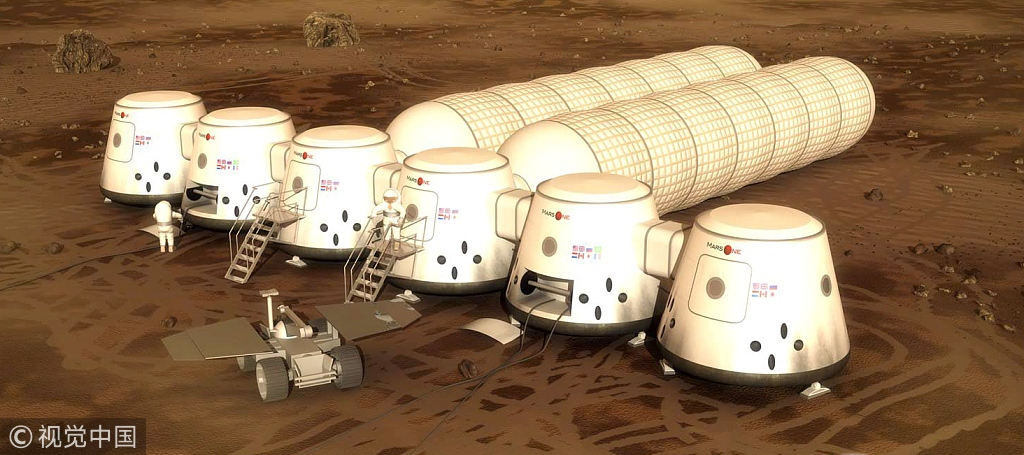
Opinion
17:45, 14-Feb-2019
Death of Mars One: Frivolity is never the pathway to true innovation
David Lee

Editor's note: David Lee is a consultant and author based in Beijing who works on cross-cutting themes of energy, health, international politics, and international development. The article reflects the author's opinion, and not necessarily the views of CGTN.
The controversial Mars One, which in 2012 announced an ambitious plan to colonize Mars, has made the headlines again, only this time in disgrace. According to tech-news website Engadget, the startup company was declared bankrupt by a Swiss court last month, though Mars One founder and Dutch entrepreneur Bas Lansdorp claimed that the non-profit Mars One Foundation will continue to operate. It seems to me, nevertheless, that the unbelievable saga of Mars One has finally come to an expected end.
Since its inception, Mars One had been questioned by scientists and engineers alike for the lack of solid science and any credible logistical arrangements for its heavenly expedition. Rather, the Mars colonization plan, including its enlisting of volunteers, looked very much like a suicide mission that made any romantic heroism sadly look like diehard foolishness.

Computer graphics show a proposed Martian colony developed by the team at the Mars One space exploration company. /VCG Photo
Computer graphics show a proposed Martian colony developed by the team at the Mars One space exploration company. /VCG Photo
If anything, the death of Mars One sounds yet another loud alarm against frivolity in pursuit of true innovation.
Unfortunately, such frivolity has been frequently on show in recent times.
While Mars One fell short of space, China's "car-eating traffic-beating straddling bus" design flopped on earth. It was a Blade Runner-kind of futuristic design of the Transit Explore Bus showcased at a 2016 Beijing expo. The two legs of the bus would run along rails laid along the roadside, allowing cars to drive underneath the elevated bus carriage. The project would eventually vaporize, leaving a trail of bad debt with panicked investors crying foul of a Ponzi scheme.
Wondrous heavenly and earthly transportation aside, the promised miracle of health routines made easy have also gone bust badly. Stanford-educated entrepreneur Elizabeth Holmes and her Theranos startup claimed to offer revolutionary hassle-free blood tests with tiny amounts of blood, but would only later be exposed as having cheated all along. Theranos ceased operations last September.
What I mean by frivolity takes multiple forms. To begin with, it takes the form of an inflated business case built on ungrounded storytelling. Financially, it involves unscrupulous risk-taking that defies sound judgment. Technically, no room is allowed for good science to play its due part, only a long and difficult process that would test the most patient. Even worse, the boundary often blurs between frivolity and outright fraud.

Will humans one day live on Mars? /VCG Photo
Will humans one day live on Mars? /VCG Photo
Just because the proclaimed cause is a nice and noble one that apparently embraces the high-flying innovative spirit of the times, as was the case with Mars One, Transit Explore Bus and Theranos, there's no guarantee of the end result.
These cases of frivolity certainly don't provide the pathway to true innovation; instead, they lead to not only business loss, but also biting injustice that hurts customers, investors and communities alike. As such, I'd say frivolity is one of the biggest dangers that threaten the promise of the information age, or Industry 4.0, or the Digital Age, or whatever fancy term we want to name our era of explosive discoveries, inventions and technological advancements.
Our age is a truly exciting one. It won't be short of seemingly crazy ideas. Some will deliver, but many others may just fizzle.
In the end, the key is not to deny Elon Musk and other seemingly crazy aspirants the opportunity for experimentation or trial and error, but it is to always guard against frivolous actors who are sure to come, make a splash here and there, do some (hopefully limited) damage before having to quit the scene.
(If you want to contribute and have specific expertise, please contact us at opinions@cgtn.com.)

SITEMAP
Copyright © 2018 CGTN. Beijing ICP prepared NO.16065310-3
Copyright © 2018 CGTN. Beijing ICP prepared NO.16065310-3